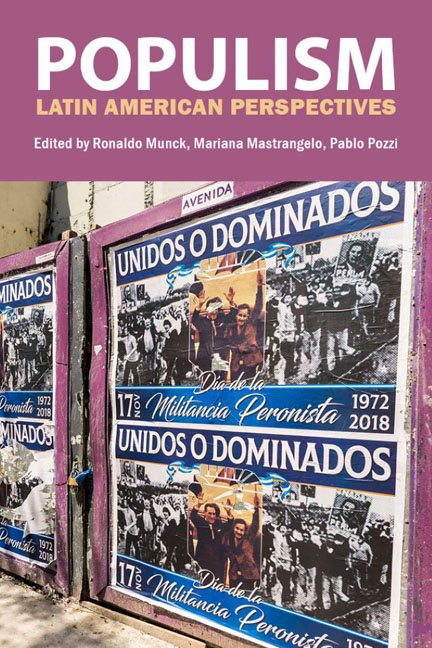Book contents
- Frontmatter
- Contents
- Abbreviations and acronyms
- Foreword
- Introduction
- 1 Populism in Latin America: development, democracy and social transformation
- 2 Peronism in Argentina: left or right?
- 3 The populist left in Chile: socialists and communists from 1936 to 1973
- 4 The left and the Workers’ Party in Brazil: a party between populism, social policies and the popular vote
- 5 Brazil, Bolsonaro and populism of the right
- 6 Political dilemmas of the government of López Obrador: between populism, democracy and the left in Mexico
- 7 The Bolivarian process in Venezuela: socialism, populism or neoliberalism?
- 8 Populist responses to crises of market democracy: the case of Bolivia’s Evo Morales
- 9 Ecuador: populism and the 2007– 17 political cycle
- 10 The Nicaraguan crisis and the mirage of left populism
- 11 Populism and the right in Latin America
- 12 Populism and the left in Latin America
- Afterword: a tale of two “people”: national popular and twenty-first-century Latin American populisms
- Contributors
- Index
2 - Peronism in Argentina: left or right?
Published online by Cambridge University Press: 23 January 2024
- Frontmatter
- Contents
- Abbreviations and acronyms
- Foreword
- Introduction
- 1 Populism in Latin America: development, democracy and social transformation
- 2 Peronism in Argentina: left or right?
- 3 The populist left in Chile: socialists and communists from 1936 to 1973
- 4 The left and the Workers’ Party in Brazil: a party between populism, social policies and the popular vote
- 5 Brazil, Bolsonaro and populism of the right
- 6 Political dilemmas of the government of López Obrador: between populism, democracy and the left in Mexico
- 7 The Bolivarian process in Venezuela: socialism, populism or neoliberalism?
- 8 Populist responses to crises of market democracy: the case of Bolivia’s Evo Morales
- 9 Ecuador: populism and the 2007– 17 political cycle
- 10 The Nicaraguan crisis and the mirage of left populism
- 11 Populism and the right in Latin America
- 12 Populism and the left in Latin America
- Afterword: a tale of two “people”: national popular and twenty-first-century Latin American populisms
- Contributors
- Index
Summary
INTRODUCTION
Populist movements usually emerge as events: no one is expecting them, but they suddenly take place. Because they directly affect established domination regimes, due to the fact that they are anti-establishment movements strongly supported by important sectors of the subaltern classes, both adhering and opposing sides tend to highlight their disruptive character. The former experience them as revolutions, and the latter as cursed creations of a leader with authoritarian tendencies and charismatic attributes who manages to ideologically manipulate the masses by resorting to irrational elements. Fortunately, these longstanding, deep-rooted categorizations have progressively lost their strength and have led to less emotionally and politically driven analyses. However, there is still a tendency in this direction, as seen in questions like the ones in the title of this chapter, which (as many others) seeks to analyse the Argentine case of populism in terms of whether Peronism is right wing or left wing. But is this question as posed even appropriate to better understand a phenomenon such as Peronism? A perspective anchored in a “Yes, it is”/“No, it is not” polarity can only partially ensure a critical and objective approach to explain Peronism. It is my intention to explore the conceptual potential of the idea of simultaneity as a passive revolution, in terms of the relationship between Peronism and the working class, to allow us to bring the heterogeneity of historical reality into play.
EX MACHINA ORIGIN
A prevailing tendency of sociologists, historians and political scientists, when interpreting Peronism, was to search for its permanent characteristics in its original stage. Gino Germani, an Italian sociologist who escaped fascism, was the initiator of that initial scheme, based on a structural-functionalist interpretation of a failed correspondence between socioeconomic modernization and political participation. This concept was surpassed gradually. As decades passed, an explanation anchored in its origin was seen as insufficient to describe it, either as a political identity that remained unshakable for most of the Argentinian working class or in terms of the politico-ideological evolution that occurred in the country as of the 1960s.
- Type
- Chapter
- Information
- PopulismLatin American Perspectives, pp. 27 - 48Publisher: Agenda PublishingPrint publication year: 2023

